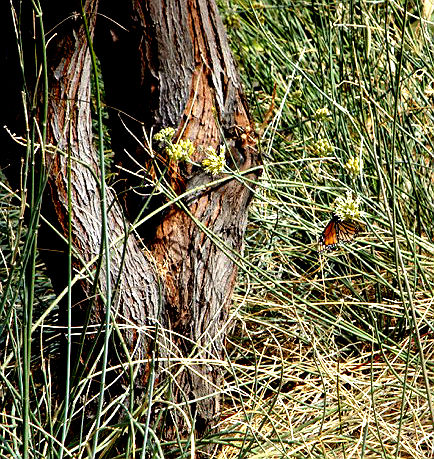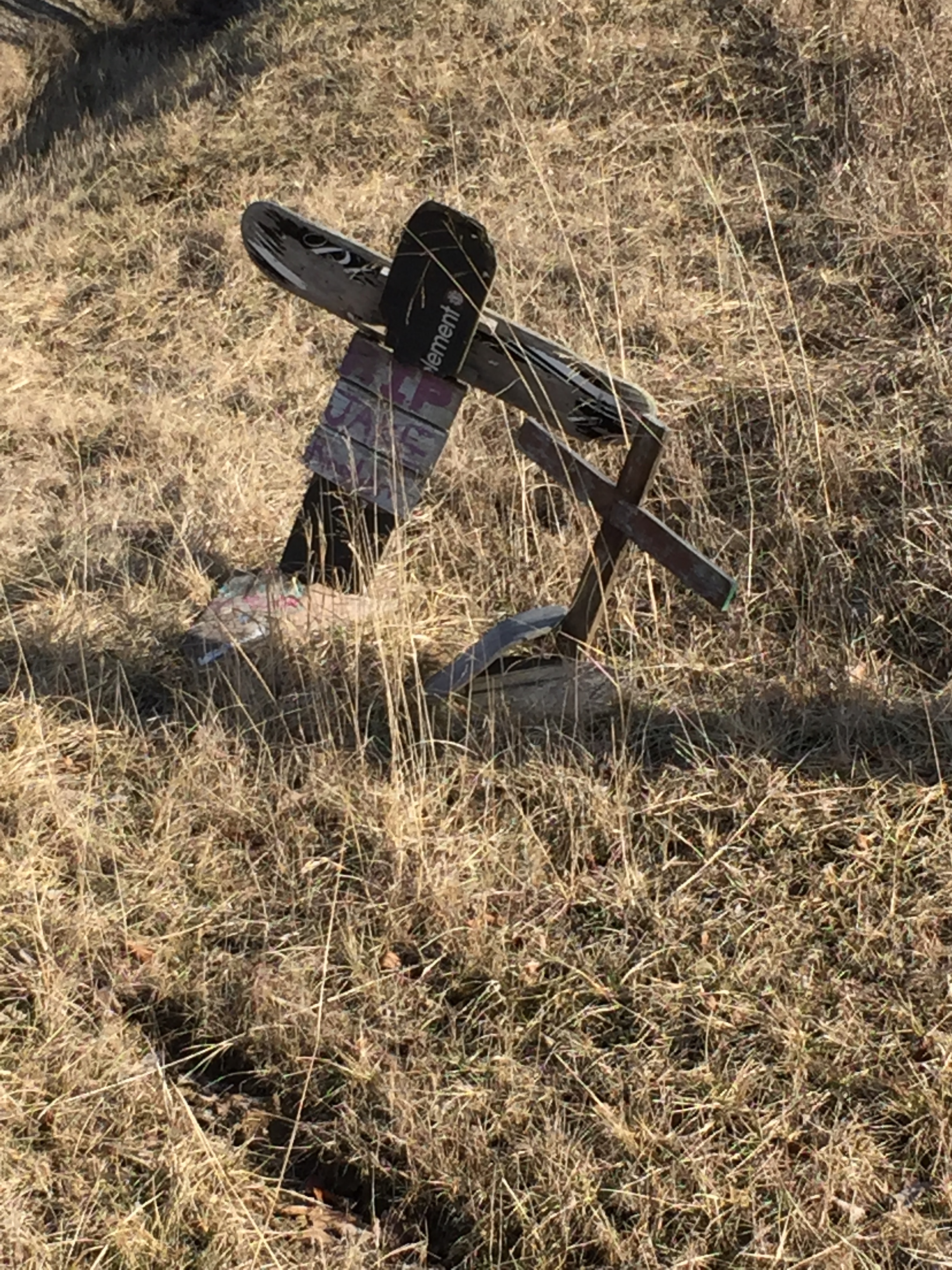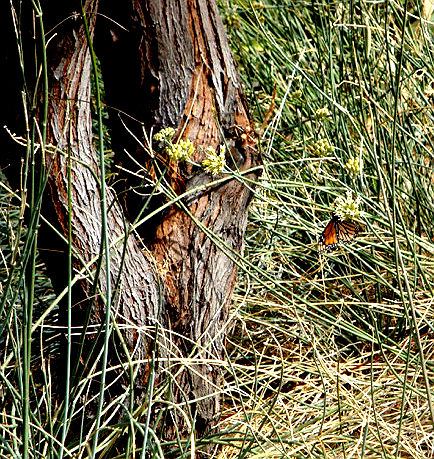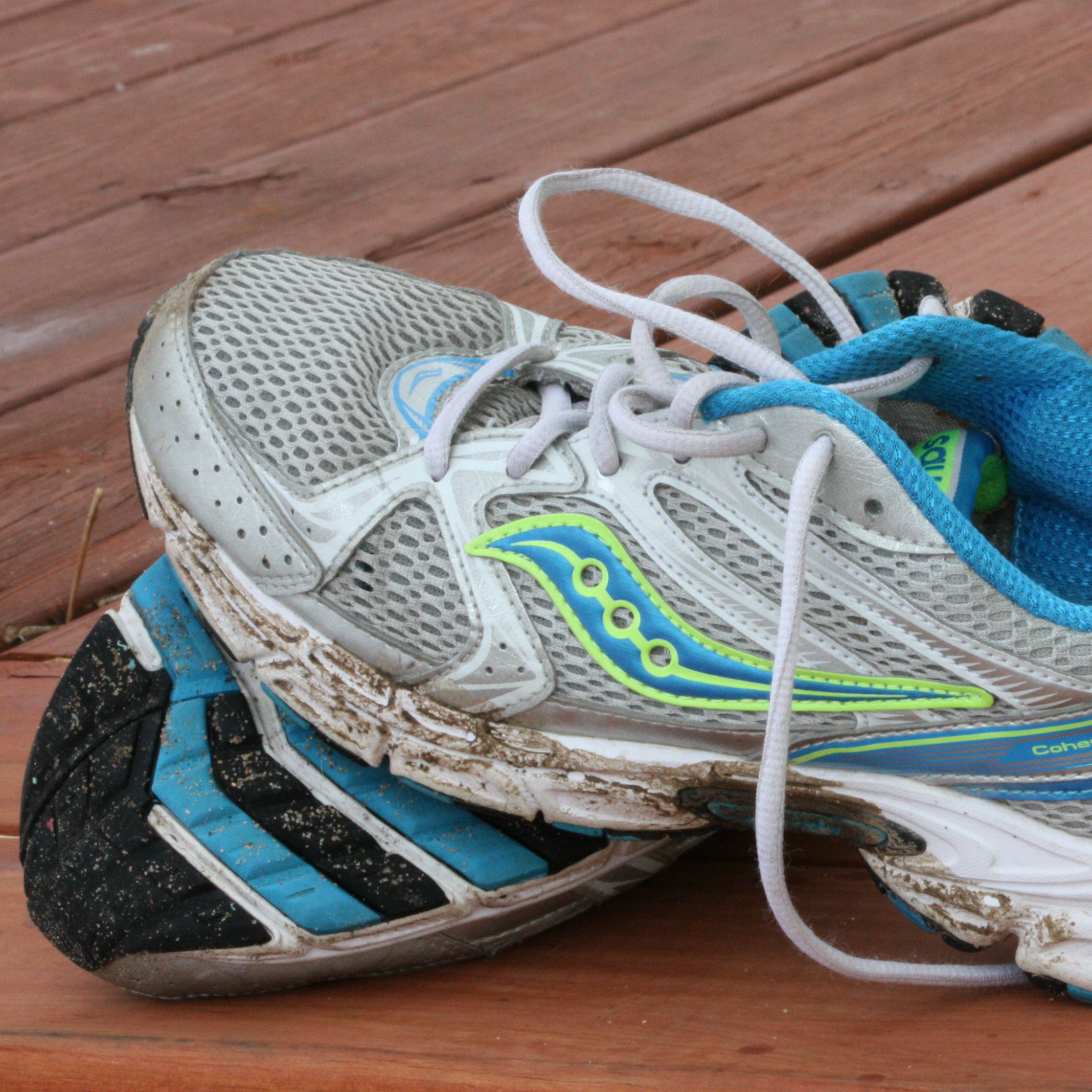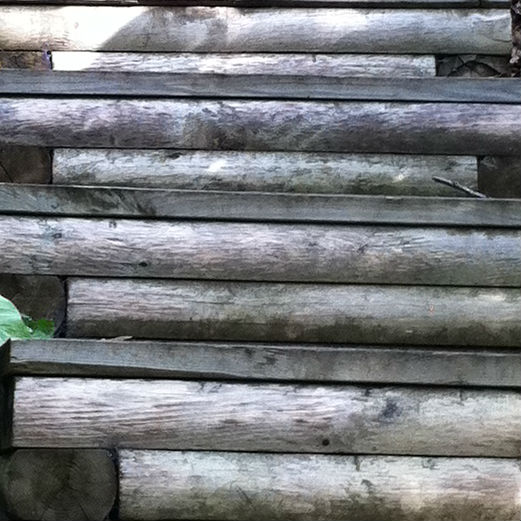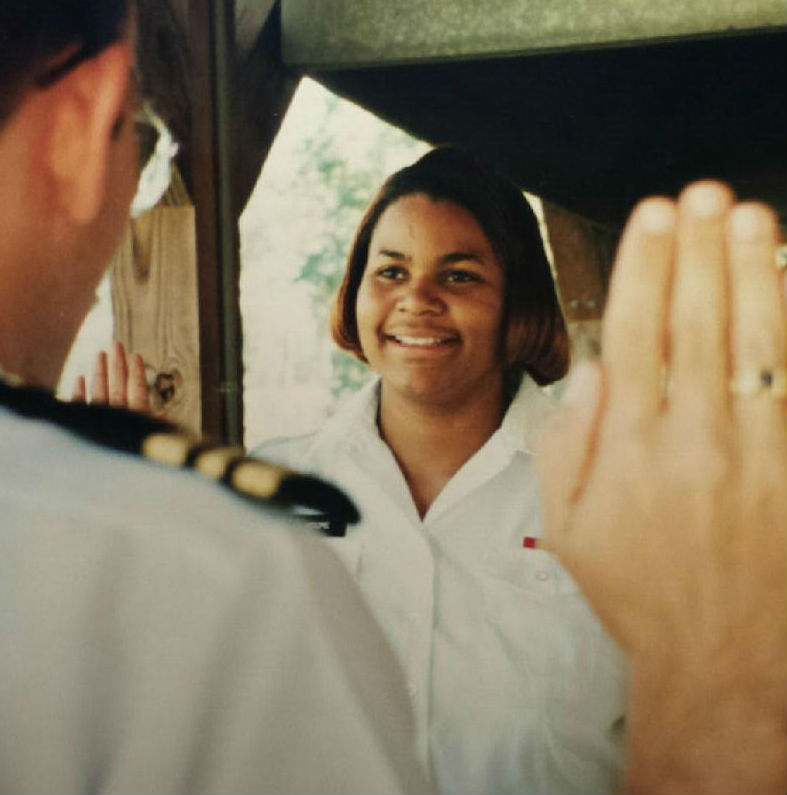We make our way down into the canyon, alone on the trail, the air hushed, almost eerie. Faint sounds—a human voice, the shuffle of hooves—break the stillness. A ranch hand on a buckskin horse rides into view, urging his train of pack mules up the footpath, their bodies swaying in disjointed rhythm. To make room, Danny and I press our backs against the inside wall of the South Kaibab Trail, knowing the other side of the narrow path drops into the Grand Canyon. Sweat collects under my arms, on my forehead. I push harder into the stony dirt behind me until I resemble a modern petroglyph. I’m scared. I don’t want to be the reason someone or something falls over the edge.
The man nods, tapping the brim of a black hat protecting his weathered, unconcerned face. The five mules snub us. They breathe heavily, blink, bob their heads, pass close enough to count their eyelashes. It’s hard to ignore their fetidness or the dust settling gritty in my mouth, in my nose. Linked together by a loose rope, they carry bags of refuse from facilities down by the river. I was told mules have the right of way. I’m a believer.
We brush ourselves off, continuing down the steep seven-mile trail, late August sun hot on our skin. A labyrinth unfolds of pinks, browns, and orangey reds, its mesas and buttes painted with shadow, hinting of mystery. My awe mixes with apprehension, but Danny reminds me, “You have to experience this place, not just stand on the rim like a voyeur.”
Right after graduation from college in Buffalo, a girlfriend and I took what was supposed to be a two-week fling vacation to Los Angeles. We had a place to stay with her aunt. It turned into three months for me. A summer of fun supported by savings and part-time jobs—and getting my own apartment. The LA area was like a candy shop, bustling with tastes I’d never experienced. But reality smacks me. The party’s over. I have to go to work. Real work. The question is where? Do I want to begin my teaching career back east or on the west coast? Do I want to return to my hometown in Western New York or stay in Los Angeles?
Rather than deal with the conundrum or admit September is just days away, I’m in the Grand Canyon with Danny. We’ve dated all summer, after meeting in Venice Beach at a volleyball game the first few days I was there. He’s English, from Barbados, a new UCLA grad with a degree in business economics and the promise of a job in his uncle’s L.A.-based insurance company. His future is secure. My future feels anything but, even with a new Bachelor of Science degree in Education. If I’d thought I might want to stay in California—I didn’t realize the idea had been growing—I should have been interviewing for teaching positions. I played instead.
Curiosity gradually pushes aside these thoughts and the uneasiness I felt at the Kaibab trailhead as we pass layer upon layer of limestone, sandstone, shale. We see surreal sculptures chiseled by wind, driving rain, ice. We see hidden gorges, gaping crevices, each bend in the path revealing a new formation. At the bottom, we’ll find a final layer of metamorphic bedrock supporting the canyon, preserving its stories. I think of my bedrock, my heritage of strong, solid people from England, Germany, and France, who were farmers, commercial fishermen, and factory workers, who left family and hometowns in Europe and worked hard to establish themselves in a land different from their own. I know their stories; now I wonder about mine. I feel new, experimental layers pressing, trying to shape me.
Compared to my conservative upbringing back east, southern California life is more free, the social scene more fluid. It’s a great place to see and be seen. I’m wide-eyed at the beaches and clubs. People are tanned, blond, and outgoing. They play volleyball, swim, surf. They seem to balance work with fun. And just when I think I’m a little comfortable, a little more relaxed, something happens. The new friend isn’t. The quiet of my apartment complex by day explodes into annoying neighbors with blaring televisions at night. The city neighborhood bustles with excitement, only to deliver disinterest.
Despite the negatives, I like what I see. I walk along busy Vermont Avenue, with its boutiques and ethnic restaurants, with the lure of pizza and deli. I hear the rhythmic cadence of different languages and the blare of music emanating from a small club. It’s a place far from small town Main Street and small town viewpoints. What I don’t like is feeling lost, losing identity. I become a speck on a canvas of bustling humanity, full of fears and anxieties. I had these same feelings as a lowly seventh grader attending my first day of high school. Would anyone notice me or want me? I was a microscopic ant then like I am now, descending into the canyon.
As we make our way down, we pass ponderosa pine, pinyon pine, oak, desert scrub. Farther down, dead tree trunks surrounded by sun-scalded vegetation reach gnarled limbs toward us. There’s little shade. Solitary lizards scurry from rock to rock. A sudden flurry startles us as a colony of bats, their fragile wings cupping the air, soars from a crevice, filling the sky. I feel their black eyes assess us. Unlike them, my own wings falter, my own eyes peer into the future, look away. Because when I look, I feel a sense of vertigo, of jumping from the trail into unknown space.
Switchback after switchback of downhill bracing pushes my toes into the tips of my boots. My calf muscles ache. Despite the discomfort, a mantle of prehistoric time wraps around me, welcoming me onto this sacred land. I feel the presence of a people who lived here for thousands of years, leaving arrowheads, stone tools, grinding stones, and petroglyphs for others to find. I imagine families who played, loved, worked. Who quarreled, faced challenges, cried. Who sought guidance from gods, shamans, their elders. From nature. I place my fingertips on the rough wall, trace the edge of a thick layer of small stones set in fine gravel, sandier than the one upon which it rests. Fragments tumble down onto the path, like lives tumbling through time. I grow quiet, thoughtful.
I wonder about the ancient people I feel around me, the young men and women. Did they ever want to leave the fold? To what consequence or punishment or sacrifice? I never thought about leaving Buffalo permanently after graduating from college there. My trip to California was supposed to be a vacation. It morphed into something that now made me wonder. If I were to leave my roots, what would I lose? What would I gain? Would it be worth the risk?
Then disjointed pieces of my life tumble down. I remember doll clothes my mother made for my favorite doll, my father’s work soiled hands, a new bicycle. A bedroom set for my birthday. A sometime boyfriend at home. Danny. So many thoughts.
Only the scuffing of our hiking shoes on the trail’s surface breaks into the quandary in my head and the calm around us. We adjust our backpacks. I wipe my forehead, swat at flies, scratch a bite on my arm. I think about a 2,600 mile trip to California, about an Arizona hike taking me a mile deep into the earth. I wonder what the hell I’m doing. Deep down, I know. I’m doing what my mother taught me.
She was a daddy’s girl whose father died young. She watched her mother dote on a little brother. Her era, her limited means took away the chance to complete an education, have a career, or travel. From the time I was little, she sent me into the world with the admonition to not be like her.
The only role my mother knew was that of wife and mother. High school ended for her at tenth grade. She’d say, “You’re going to college.” I’d nod. She’d add, “Did you hear me?” It never occurred to me to not go. When I turned 16, she took me to the Social Security Administration for working papers. She’d say, “You want to be able to earn your own money.” That sounded good to me. For a long time my mother didn’t learn to drive, but she helped find my first car which I bought with my own money. That car also brought me freedom. She created opportunities for me, far greater than hers.
At the same time, she judged me. I juggled this confusing stay-go message, trying to maneuver myself through the long dangling apron strings. When I stayed within reach, she’d push me away. When I pulled away, she’d guilt me close. There were many words, her words.
“Don’t be like me,” she’d say as she counted the money she’d saved so carefully to buy material to make my school clothes.
“Why are you late?” was the question she’d ask when I came home from school after basketball practice or band rehearsal. I sensed she was suspicious of after-school activities because she’d never experienced them herself. To her, they could be a waste of time or an opportunity for trouble.
“Where have you been?” was asked when I came in from a friend’s house. My mother worked hard all her life, with little time for socializing. I was told friends would waste my time.
“You’re too independent,” she said when I expressed a different opinion about a person or an incident. I lived with my parents while I attended undergrad school in downtown Buffalo during the day and worked as a grocery checker on the weekends in a supermarket near my home. My world broadened beyond hers, through no fault of my own.
I tuck her words away as Danny and I continue on the trail, drinking bottled water to keep hydrated, eating raisins or nuts. We check for blisters. We talk about finally being out of college, starting our careers, the heat. Then Danny wants to talk about us.
“I think we’re great together,” he says. I nod but don’t answer. Then he says, “Hey, I’m talking here.” But I point to a hawk soaring overhead, walk faster. Dissemble.
I wonder about the West Coast. I’m used to ice skating, skiing, swimming in Lakes Erie and Ontario, lying under huge weeping willow trees, hearing the thunder of Niagara Falls. I’m used to an old, traditional city where nothing is too far away. Los Angeles and the adjacent San Fernando Valley spread for miles. There’s distance between places, space between people. I’ve tried to find a center, a neighborhood, a tribe. I fight being alone, being lonely, even though I’ve met Danny. He likes me. I like him. I also know he’s a crutch to lean on. I’m not proud of this, and I wonder if he senses it. It’s not my intention to hurt him or hold back. He’s a good guy. I just want to find my own legs without a crutch.
At last, we round a jutting rock formation to see the clear azure water of Bright Angel Creek tumble into the muddy Colorado. The Kaibab Suspension Bridge leads us across the river where we walk a well-worn path with knee-high grasses whooshing against our legs, cottonwood branches brushing our shoulders.
Quickly, we claim a space in the campground, run to Bright Angel Creek, sink into the cold. Danny splashes water on me, his laughter echoing around us. My long legs take me downstream away from him, but he catches up, hugs me. “You’ve made it to the bottom. You’re halfway there,” he says. I think about this bottom, being halfway. Danny doesn't realize it but his words take me into my own canyons. I'm halfway into a journey. Halfway into what could be a major turning point. Halfway into a relationship with him. And halfway away from the crags and crevices of my relationship with my mother. I can’t run any farther. I’m at bottom, looking up at too many decisions.
After supper, darkness closes around us, except for neon bright stars. Sleeping bags on the ground beside each other, we slip inside. Danny puts his arm across me, falls asleep. I catnap. Something rustles down by my toes, bumping along the foot of my sleeping bag. I grab my flashlight in time to illuminate the backside of a skunk waddling off into the darkness. Danny laughs when I move my sleeping bag up on a picnic table. Soon he does the same. Then he’s asleep. Again.
I’m very much awake now, not because of the skunk. I lie beneath an ageless sky in an ancient gorge, feeling unsettled, out of place. Homesick one minute, wanting to stay out west the next. This is a grand life choice. I want to get it right. If I stay, I’ll have to scramble. Substitute teach, waitress, job hunt. If I go home, a position in a junior high school waits for me. There’s also my on again/off again boyfriend Ron, a bass player with a local group on the weekends, English teacher by day. I miss the clubs where he plays, the music, our closeness, him. I run my fingers through my hair, try to fall asleep.
I’m restless. With each roll left or right, I’m afraid I’ll fall off the table. My back aches from the unforgiving board; even my mind aches. If I stay, what if I can’t support myself? I’ll eat peanut butter by the case before asking my parents for money. I’m not interested in being laughed at or admonished or hearing an “I told you so.”
Daylight arrives too soon. Already, coffee brews in a nearby campsite. We dig in our packs for pre-made food and begin our hike out via the nine-mile Bright Angel Trail. We pass tourists, swaying on mules, making their way down to Phantom Ranch. They look excited, energetic. I’ve exhausted myself, peeking under veneers, prying into fears, scraping and peeling. I slowly realize an ageless canyon has embraced me in its stillness, lured me to think, to listen, to discover.
The image of a cold beer at the old El Tovar Hotel not far from the trailhead near Grand Canyon Village pops into my mind. I try to keep that picture only to have it kaleidoscope away, replaced by mirrors, colors, and patterns of home. Of friends, family, a job. Of monotony, closed thinking, an easy rut.
Of my mother. The last time I talked to her, she said, “Staying is up to you, but remember, you have a job waiting for you here. And you don’t have a job in California. You’d better think about that. And what about Ron?”
I’m sure she felt the best place for her imperfect daughter was at home, with the familiar. I suspect she also sensed the independent woman she had shaped might fly.
When we reach the trailhead, we turn to look out on the panorama, on the great spectacle of space, of color, of shadow. I’m more awed than when we began, but I’m no longer scared. I see new possibilities, new opportunities, new adventures.
And I know.
I’ll choose my mother’s mantra to not be like her. The mantra that built a chasm between us. I feel sad she doesn’t realize what she’s created, that I’ve become a young woman fulfilling many of the dreams and desires her own life’s path was denied. I know her spoken and unspoken lessons give me the strength to let go of Danny, to let go of Ron back home. They give me the courage to stay in California, to enter a new and bigger world on my own.
And I whisper my thanks to her.
Carol Mann writes fiction, nonfiction, and poetry. Her work has appeared in literary journals and magazines such as Bloodroot, RiverSedge, Phantom Seed, Dual Coast Magazine, and The Sun Runner Magazine. On her blog “Written Beneath the Palms” at www.carolsmann.com, she ruminates about writing and other of life’s conundrums. She holds a Bachelor of Science in Education from Buffalo State College (SUNY) and a Master of Arts in Theatre from California State University Fullerton (CSUF). A southern California transplant from Buffalo and former teacher, she lives with her husband Tony near Palm Springs, California, where she often can be found enjoying a date shake and a good book.
